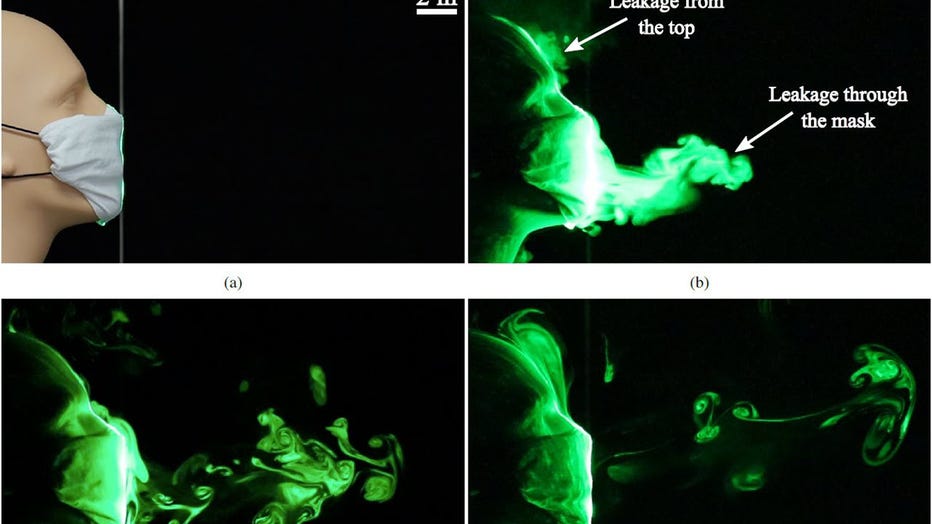Study uncovers which non-medical face mask best protects against coronavirus
LOS ANGELES - Researchers say face masks can prevent the spread of COVID-19, but which type of mask is the most effective?
While there are relatively few specific guidelines pertaining to mask materials and designs, a new study from Florida Atlantic University, titled “Physics of Fluids”, found which types of masks offer the best protection against the coronavirus.
Researcher Siddhartha Verma and his team experimented with different choices in material and design to “determine how well face masks block droplets as they exit the mouth,” the study explained.
“We tested actually three homemade masks and one off-the-shelf commercial mask,” Verma said.
Using droplets that were coughed and sneezed out of a mannequin head, the group of researchers used a laser to detect droplets and map their path.

Mask simulation displays the leakage from folded cloth masks.
RELATED: Doctor demonstrates how face mask blocks respiratory droplets from spreading
The researchers found that well-fitted homemade masks with multiple layers of quilting cotton offered the best protection. These masks significantly reduced the number of droplets, according to their findings.
“If you take a look at the fabric, the individual threads are relatively thick, and all of it is very tightly woven together,” Verma said. “That’s why it was able to stop the droplets from spreading out too far.”
Bandanna-style coverings and loosely-folded face masks reduced the distance traveled by droplets from between 25% to 50% of that for an uncovered cough.
The study showed that droplets without a mask traveled an average of 8 feet, with a maximum distance observed of roughly 12 feet. With the quilting cotton fabric, forward motion was reduced to 2-3 inches.
RELATED: Amid coronavirus spikes, COVID-19 testing demand is outpacing capacity, major test providers warn
Verma said all tests were done in a very quiet and still environment, dissimilar to general areas where ambient air flow and other factors can affect the rate and how the droplets spread. Also, the setup used a simplified representation of a cough, which, in reality, is a complicated biological process.
While the study illustrates that masks are important, Verma says that they are not a substitute for social distancing.
“If you take a look at the visuals, you can see there’s a lot of leakage from the sides and from the top, even for the best mask.” Verma said. “So masks are not 100 percent effective. Using a mask doesn’t reduce the risk of transmission to zero. That’s why it’s so important to use a combination of masks and social distancing.”

